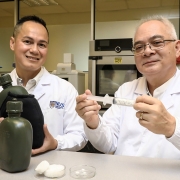Singapore Offers Many Opportunities
Companies wanting to invest in the Republic of Singapore face favorable conditions.
As reported by the online edition of Singapore-based newspaper “The Straits Time”, the city-state‘s economy performed in 2017 much better than expected. Therefore, the Ministry of Trade and Industry (MTI) upgraded its 2017 full-year gross domestic product (GDP) forecast to three or 3.5 percent. This is up from an earlier estimate of two to three percent. According to FocusEconomics, a provider of economic analysis and forecasts for 127 countries, economists estimate that Singapore’s growth should remain healthy in 2018. “Robust export growth on the back of solid trade dynamics, together with pro-business government measures, should fuel a rebound in fixed investment,” the information said in December 2017. “Fixed investment will also benefit from increased public spending on infrastructure.” FocusEconomics panelists expect the economy to grow 2.7 percent in 2018 and 2.6 percent in 2019.
Industry: urban solutions and sustainability
According to the Singapore Economic Development Board (EDB), a governmental agency under the Ministry of Trade and Industry, the city-state is “home to some of the biggest companies who are innovating, testing and collaborating to develop and commercialize sustainable solutions”. Five key pillars – infrastructure, built environment, clean energy, water and environment, urban mobility – are promoted by EDB, which is responsible for strategies that enhance Singapore’s position as a center for business, innovation and talent. Together, these industries form the urban solutions and sustainability sector. With a growing emphasis on water and the environment worldwide, the country considers itself as well positioned. “Singapore is recognized as a ‘Global Hydrohub’ with about 180 water companies,” EDB emphasized. These firms represent the entire value chain of the water industry. “Singapore is also nurturing the environmental industry which includes environmental consultancy, waste management and pollution control.”
One of the pro-business measures is PPP (public-private partnerships). Partnerships between the government and companies have played a key role in Singapore’s sustainability and urban solutions agenda, EDB underlined in December last year. “To foster such partnerships, Singapore has positioned itself as a ‘Living Laboratory’, by availing its national urban infrastructure to companies both local and foreign, to develop, test and commercialize innovative solutions. This allows the government to harness the best technologies and solutions introduced by the companies.”Companies as well benefit from using the country as a reference market to develop and sharpen their solutions before scaling up to markets in Asia and the rest of the world, the agency gave account. “This has been the approach that has enabled Singapore to build up key strengths in its water management solutions, amongst other areas. This has led to the Public Utilities Board (PUB) in Singapore jointly piloting over 150 projects with leading water players such as Suez Environnement, Anaergia and Meidensha, over the past eight years.” PUB‘s invitations to tender are published on the GeBIZ website at www.gebiz.gov.sg.
The Singapore Economic Development Board undertakes investment promotion and industry development in the manufacturing and internationally marketable services sectors. The government agency also works with companies by providing information, connection to partners and access to government incentives for their investments, as well as their transformation and growth initiatives. “We also work closely with other Singapore government agencies to constantly improve our pro-business environment, and ensure that our industries are supported by a globally competitive workforce through talent development,” EDB emphasizes.
Photo: pixabay
GR12018







